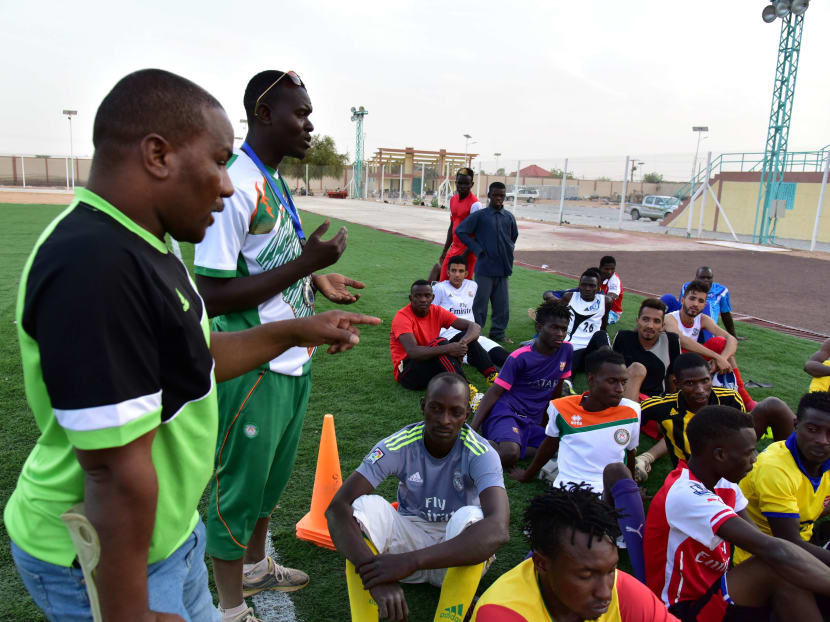Migrants with European dreams fuel Niger football club
AGADEZ, NIGER — As Africa’s smuggling capital, a dusty city in central Niger has found its local football team boosted by an unexpected influx of new players: Migrants in limbo awaiting passage to Europe.

Bachir Ama, left, president of the Nassara Agadez football club, has hired four Nigerians and four Ivorians stranded while waiting to reach north Africa or Europe. Photo: AFP
AGADEZ, NIGER — As Africa’s smuggling capital, a dusty city in central Niger has found its local football team boosted by an unexpected influx of new players: Migrants in limbo awaiting passage to Europe.
Located on the edge of the Sahara, Agadez is a major transit point for migrants hoping to travel north to seek work in either Libya or Algeria, or to try to risk the hazardous boat journey to Europe.
But hundreds have been stuck here after running out of money, or have returned after a first failed attempt to get to Europe.
Cooling their heels, many of them turn to what they know best — playing football.
And here that means playing for Nassara Agadez, a team in Niger’s second division.
“The president of the club promised me that he will get me to Europe,” said 16-year-old Mohamed Diaby, a talented Ivorian who trained with a leading football institute in Abidjan, Ivory Coast’s main city.
“I didn’t want to stay on in Ivory Coast, there are too many people” there trying to earn a living through football, he said.
“I told myself: I will make my life elsewhere.”
The club’s president Bachir Ama, a one-time fixer who used to transport migrants to Libya, promised to pay Diaby’s passage to Europe if he played for the club for one season.
And Diaby is not the only one making the most of his skills in this arid transport hub.
There are eight migrants on the team: Four Nigerians and four Ivorians, who earn salaries of up to 100,000 CFA francs (about S$235), and also get accommodation.
At the local stadium, around 30 players are training on a brand-new Astroturf pitch, a gift from the government to mark Niger’s national day.
“These are people who came on the way to Libya or Algeria, but were stranded here,” Ama said.
“They need work, and as football is their profession, so they have come to us to play.”
And in Agadez, they have a wide pool to choose from, given the huge numbers crossing Niger: In 2016, the International Organisation for Migration (IOM) counted some 335,000 migrants heading north, and another 111,000 going the other way.
The club is one of the best in the Agadez region, and players hoping to join must pass a trial. Recruiting only “the best”, Nassara have beaten all of their regional rivals and entered the final 16 of the Niger Cup.
Many youngsters are keen to try their luck, one of whom is 16-year-old Toya-se Tunchi Bondo from Liberia.
He spent a day training with the club, but was not taken on as the season’s transfer and recruitment window had already closed.
“It feels good to play,” said Bondo, a defensive midfielder who has been taken in by the IOM. “All I do is sleep, and wait.”
An orphan, he ended up in Agadez after a failed attempt to play for MC Oran on Algeria’s northwestern coast.
Football has been a driving passion of his since his childhood, with the teenager travelling thousands of miles simply for the chance of showing off his skill.
Born in Monrovia, the seaside capital of Liberia, he was raised by relatives in Ivory Coast, then in Ghana where he played for the youth league of Cheetah FC.
Returning to Liberia, he found it impossible to earn a living from football, so he decided to go to Algeria after a Facebook “friend” promised him a contract with MC Oran.
After crossing Burkina Faso by bus, he travelled through Mali to the eastern city of Gao, where he was picked up by a truck.
“At one point, we had to get out to walk through the desert to cross the border. It took three to five hours. It was hard. We were in a group, and five of the people died,” he said.
When he finally reached Oran, he learnt that the club “no longer recruits” black Africans following the 2014 death of a Cameroonian player who was hit in the head by a projectile thrown by rival supporters.
The club did let him train with its reserve team, but did not pay him, so he worked as a builder for four months in the hope of being able to reach Spain.
When he realised this was impossible, he began making his way to Agadez, where he was told the IOM could help him. En route, he was robbed and stripped of everything he owned.
Now in Agadez, the IOM has arranged for him to be sent back home to Ghana.
Despite the hardship, disappointment and frustration that have marked his young life, Bondo still dreams of just one thing.
“I want to play football.” AFP





